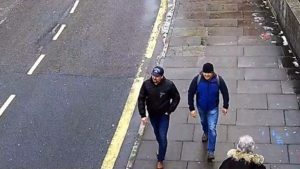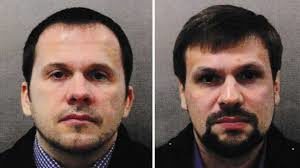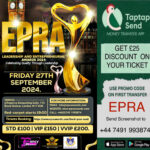The US, France, Germany and Canada have agreed with the UK that the Russian government “almost certainly” approved the poisoning of ex-spy Sergei Skripal and his daughter Yulia in Salisbury.
They have urged Russia to provide full disclosure of its Novichok programme.
At a UN Security Council meeting to discuss the attack, Russia dismissed evidence presented by the UK as “lies”.
In a lengthy rebuttal, Russia accused the UK of “disgusting anti-Russian hysteria”.
The UK has named two men believed to be from Russia’s military intelligence service, the GRU, as the main suspects.
Theresa May told the Commons on Wednesday that the suspects had entered the UK on Russian passports using the names Alexander Petrov and Ruslan Boshirov.
She told MPs the poisoning was “not a rogue operation” and was “almost certainly” approved at a senior level of the Russian state.
The Kremlin called these accusations “unacceptable”.
The statement from Mrs May, Emmanuel Macron, Angela Merkel, Donald Trump and Justin Trudeau said: “We, the leaders of France, Germany, the United States, Canada and the United Kingdom, reiterate our outrage at the use of a chemical nerve agent, known as Novichok, in Salisbury on March 4.”
The leaders welcomed progress in the investigation, but urged those with more information to go to UK authorities.
“We have full confidence in the British assessment that the two suspects were officers from the Russian military intelligence service, also known as the GRU,” the statement added.
Referring to the expulsion of Russian diplomats from their countries in response to the 4 March attack, the leaders said they had already “taken action together to disrupt the activities of the GRU”.
The leaders said the link to the Russian service – revealed on Wednesday – would strengthen their intention to work together against foreign spy networks, the use of chemical weapons, and to “defend ourselves from all forms of malign state activity directed against us and our societies”.
The UN Security Council, of which Russia is a permanent member, alongside China and UK allies the US and France, is meeting in New York to discuss the latest progress in the investigation.
Addressing the council, Britain’s ambassador to the UN Karen Pierce, said the nerve agent attack was a “direct challenge” to the “rules-based international system that has kept all of us safe since 1945”.
But Russian ambassador to the UN, Vasily Nebenzya, accused the British authorities of “Russiaphobia” and misleading the international community and its own citizens.
“We have lost all hope in finding the truth,” he added.
Prosecutors in the UK believe there is sufficient evidence to charge the two Russian nationals with offences including conspiracy to murder; attempted murder and the use and possession of Novichok contrary to the Chemical Weapons Act.
Russia does not extradite its nationals, but a European Arrest Warrant has been obtained in case the pair travel to the EU.
Mr Skripal, 66, and his daughter Yulia, 33, were poisoned with Novichok on 4 March. Det Sgt Nick Bailey also fell ill after responding to the incident in Salisbury.
Police have also linked the attack to a separate Novichok poisoning on 30 June in nearby Amesbury, that led to the death of 44-year-old mother-of-three Dawn Sturgess and harmed her friend Charlie Rowley.






